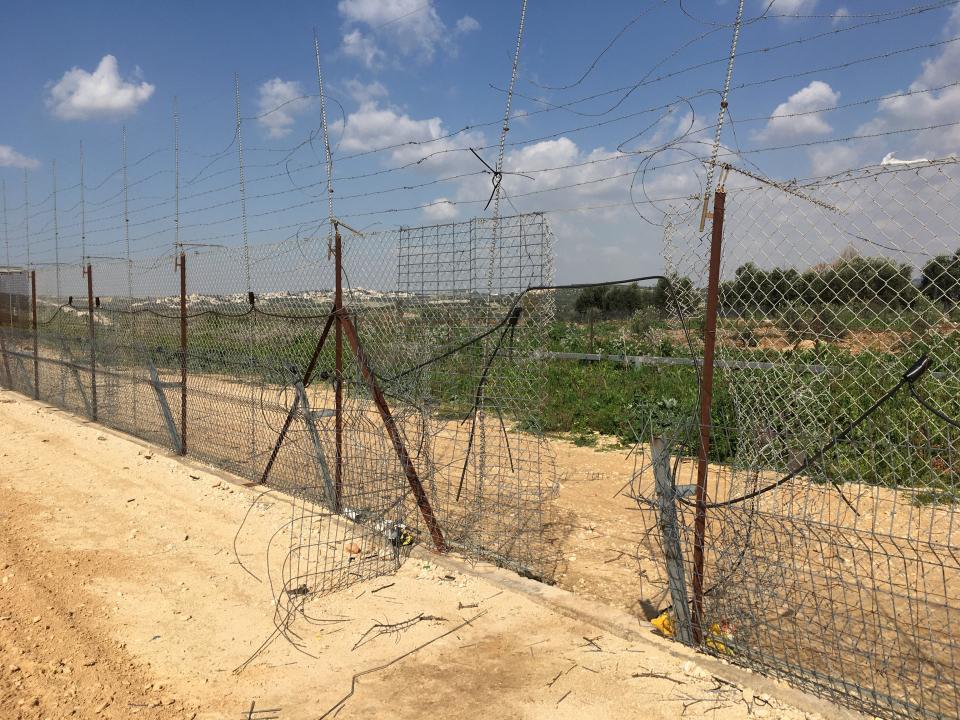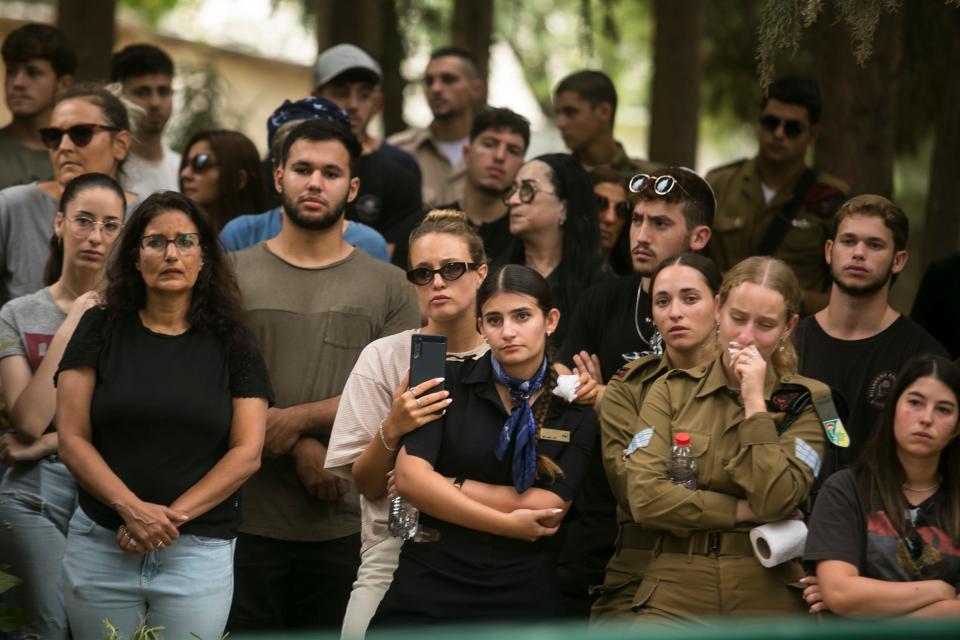We were not prepared for war. Israelis can no longer rely on our leaders to protect us.
Until Saturday, I considered the Israeli city in which I live to be relatively safe.
We’re located in the center of the country, about 45 miles from Gaza and the southern Israeli communities that are frequent targets of Hamas rocket fire. During wartime, when Hamas fires rockets our way, we have about 90 seconds from when the air raid siren sounds until a possible strike, should the incoming rockets fail to be intercepted by Israel’s Iron Dome anti-missile defense system. That’s compared with 10 or 20 seconds in the south.
That minute and a half is enough time for my wife, children and I to make it into the concrete-and-steel reinforced room that serves as our bomb shelter – and doubles as my daughter’s bedroom.
Even during wartime, most of Hamas’ rockets are aimed beyond us, toward Tel Aviv. We know whenever the Tel Aviv area is getting bombed because one of the Iron Dome batteries that intercepts those projectiles is located close enough to our home that our windows rattle and shake from the booms.
When we heard the terrible news on Saturday about the invasion of Israeli towns by Hamas terrorists from Gaza, we were horrified even as we counted our blessings that we live elsewhere.
Hamas attacks in Israel are heinous: Hamas took advantage of divisions in Israel to start a horrific war targeting civilians
The border fence between my house and the West Bank
Yet our home actually is quite close to a significant seam line: the so-called Green Line boundary between Israel and the West Bank, which marked the Israel-Jordan border until the 1967 Six Day War. Today the de facto border in our area is a barbed-wire fence that runs just inside the West Bank, separating us from the territory’s 3 million Palestinians.
The fence, which in many places elsewhere along its route is a concrete security barrier, was constructed in the early 2000s ostensibly to keep Israelis safe from terrorists originating in the West Bank.

But in my neighborhood, it takes some willful blindness to rely on this illusion of safety. That’s because the fence is full of holes and gaps – some large enough for a person to crawl through, others big enough for a truck. On my frequent bicycle rides in the area, I often encounter Palestinians who have slipped through these gaps as part of their daily commute to jobs in Israel in fields such as agriculture and construction. I know that for the most part they’re just trying to make a living, and we’ve exchanged limited, mutually respectful greetings.
I’ve always figured that the Israeli authorities are aware of these gaps (an army patrol road runs along the fence) and assumed that they were taking the requisite precautions to keep us safe from potential terrorists.
Now, after the events on Saturday – when Hamas terrorists infiltrated the Gaza border fence by land, sea and air, killing hundreds of Israeli civilians, taking control of army installations and vehicles, and kidnapping an unknown number of Israelis back to Gaza – those assumptions feel naive and dangerous.
Opinion alerts: Get columns from your favorite columnists + expert analysis on top issues, delivered straight to your device through the USA TODAY app. Don't have the app? Download it for free from your app store.
Perhaps residents of the Israeli towns near Gaza, separated from the coastal enclave’s 2 million Palestinians by their own border fence, relied on the same mistaken assumption: that Israel’s leaders were making sure they were safe.
They weren’t.
Hamas attack uncovers Israeli failures
The stunning success with which Hamas attacked Israelis this weekend laid bare countless Israeli failures, from the government to the military to the intelligence services. Above all, it revealed the failure of Israeli imagination.
It turns out border defenses are easily penetrated when Israelis are complacent. Assailants armed with explosives, bulldozers and weaponized pickups were enough to overwhelm Israel’s thinly stretched and unprepared forces near Gaza.
Drones, motorized paragliders and stealthy attacks by sea provided additional avenues of invasion.

These attacks have left me shocked and saddened. I’m deeply worried about the coming days and weeks, especially for the many soldiers I know going into combat and the unknown number of Israelis now being held captive by Hamas.
I’m also newly concerned for my own family’s safety. This invasion is a wake-up call that terrible scenarios I might have dismissed as implausible actually could happen – especially if we’re not prepared for the worst.
And we can’t assume that Israel is prepared. We cannot rely on our leaders.
Biden response to Hamas attack was weak. Trump talked about hummus. US needs strong leadership to support our allies.
This is the nightmare scenario that Israelis near Gaza woke up to Saturday, and the one that all Israelis are realizing as we bolt our doors, stay off the streets, check in on relatives and friends, and mourn the dead.
My faith in Israeli security has been shattered
I don’t have a gun in my home. I’ve never felt I needed one. The main danger for us from Israel’s fights with Hamas always have come from the air, and we have our bomb shelter. I have four children. Since Saturday, my three younger children have slept there.
After the harsh realities of this weekend, however, I’m starting to understand it’s not enough. We must prepare for other, once-unthinkable scenarios. For example, that a terrorist can show up at our front door just as they did down south. That terrorists in the West Bank could sneak through the porous security fence to try to reproduce here what happened in southern Israel.
Can I even trust that the Israeli government is handling the threat of a nuclear Iran adequately? My faith in the myth of Israeli security has been shattered.

Sunday night, I took what few weapons I have – an ax, a baseball bat, a saw – and placed them strategically around my home. We have a garden apartment, so I feel like I need to consider a possible infiltration from our yard, as far-fetched as that scenario might have seemed just a couple of days ago. I know my measly weapons are no match for a terrorist armed with a gun. But they’re all I’ve got.
As we begin to grasp the enormity of what is happening, the atmosphere in Israel is one of overwhelming sadness and despair over the unbearable losses but also of newfound determination and solidarity. In cities and towns around the country, people are mobilizing to help out with the war effort – buying and collecting supplies to send to soldiers who likely won't be home for a while, hosting families displaced from the fighting and, in so many cases, donning army uniforms and reporting for duty.
It's a bright spot amid some very difficult days behind us and ahead.
Uriel Heilman is a journalist living in Israel. He works for the Jewish Telegraphic Agency and can be followed on Facebook or Instagram.
You can read diverse opinions from our Board of Contributors and other writers on the Opinion front page, on Twitter @usatodayopinion and in our daily Opinion newsletter. To respond to a column, submit a comment to letters@usatoday.com.
This article originally appeared on USA TODAY: I thought my Israeli city was safe. Hamas attack exposes security myth

